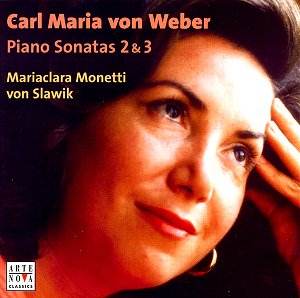Pianists
hardly rush to further the cause of Weber’s piano sonatas. No.
3 appears in a performance by Sviatoslav Richter, no less, on
Praga PR254031, while No. 2 has been put down by Emil Gilels.
But apart from these luminaries, it is pianists of the second
rank who flock to the catalogues.
All
of which is a shame. These are marvellous works waiting to receive
deserved public favour. The Sonata No. 2, in particular, is a
dream, the key of A flat major bringing Weber’s ruminative side
to the fore. It is good, then, that Mariaclara Monetti von Slawik
has turned her attention towards these pieces. Monetti von Slawik
has previously graced the catalogues with two volumes of Paisiello
for ASV, for whom she recorded a further disc of works by Castelnuovo-Tedesco
and Dallapiccola. Her repertoire is commendably wide, it would
appear, as befits a teacher of her evident stature (if her biog
is anything to go by).
Monetti
von Slawik fully realises the dreamily Romantic, almost improvisatory
element of the first movement of the A flat sonata. Her arpeggiations
are remarkably smooth and her use of pedal is entirely apposite.
She revels in the quite daringly sparse writing of the Andante
(the pauses are really quite pregnant), and her nimble fingers
are given an ample work-out in the Scherzo. The finale (marked
‘Moderato e molto grazioso’) flows effortlessly out of the conclusion
of the preceding movement. True, she is hardly a Gilels or a Richter,
but one could hardly wish for more satisfying musicality, put
entirely at the composer’s service.
The
Third Sonata contrasts significantly with No. 2, despite the similar
composition date. Marked ‘Allegro feroce’, this opens with a real
statement of intent. The contrasting musical ideas and their interaction
forms the cut and thrust of the musical argument. If the Andante
con moto is interior without the soul-searching of, say, late
Beethoven, it has a quirky, appoggiatura-laden middle section
that is quite fascinating. Monetti von Slawik’s ability to carry
legato melodies within forte is a particularly impressive
facet of her playing. A pity the tricky finale, though well executed
(she has very well trained fingers, of that there is no doubt),
is low on the adrenalin.
The
ten minute Invitation to the Dance rounds off the recital.
The delicate introduction bodes well, and acts as another reminder
tat this pianist feels at home in Weber’s early Romantic sound
world. Perhaps some of the waltz sections could have been more
uninhibited, and inner parts (which in some hands can come across
as pure delight) can emerge as literal. This is not a performance
to return to often: more of a sense of abandon is required.
Worth
the minimal outlay for the meat of the disc, then, for the two
Sonatas. It would be good to hear more from this pianist, particularly
in the interesting fringes of the repertoire where she so obviously
feels at home.
Colin
Clarke
